By: emincan yüksel
May 17 2023
Misinformation continues as Turkish elections go to second round
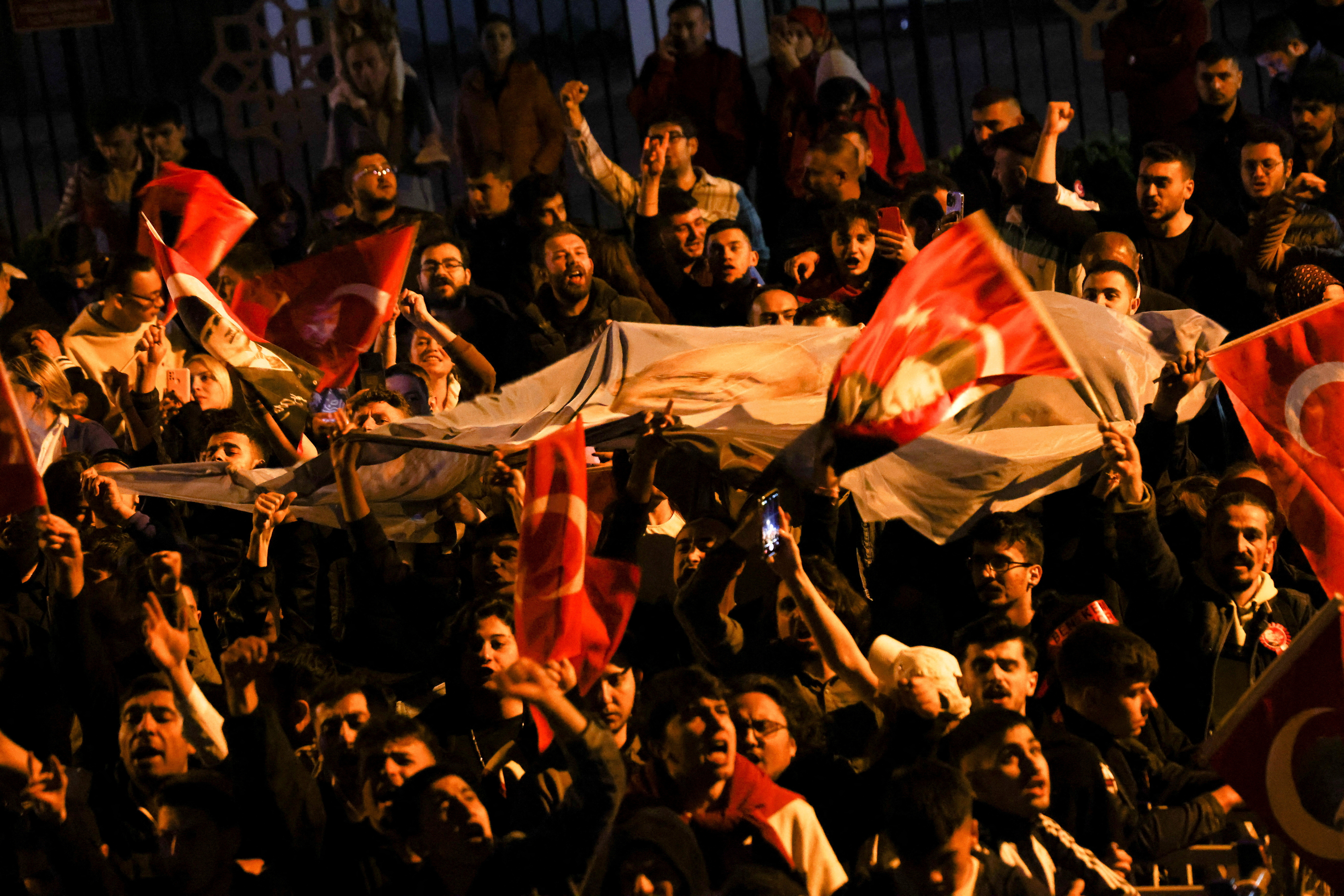
Image source: Reuters
The eagerly awaited presidential and parliamentary elections in Türkiye have concluded, but the 13th President of Türkiye has yet to be elected. According to the latest data released by the Supreme Election Council (YSK), Erdoğan appears to be the closest presidential candidate, with 49.5 percent of the votes. Nation Alliance candidate Kılıçdaroğlu received 44.9 percent of the votes, while ATA Alliance candidate Sinan Oğan received 5.2 percent. The ballot box opening rate is currently 100 percent. Both leaders have acknowledged that they could not exceed 50 percent of the votes and that the election will go to a second round.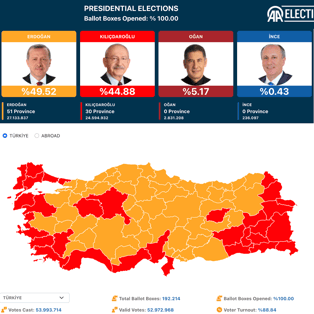
\
Election day saw the Turkish populace exposed to manipulation and misinformation, mostly centered on voting itself: voter suppression, allegations of invalid votes, accusations of voter fraud, and claims that official voter turnout did not accurately reflect the truth. Additionally, party officials made allegations of "manipulation" as vote counts were announced.
Data manipulation
In Türkiye, the state news agency Anadolu Agency (AA) provides official results and statistics, including turnout, during the vote counting. The agency reported 60 percent of the vote for Erdoğan and 36 percent for Kılıçdaroğlu to the media while only 5 percent of ballot boxes had been counted early on May 14, leading to accusations from Istanbul Mayor İmamoğlu that AA manipulated the data in their press releases and that the rates were not valid. İmamoğlu pointed out that in previous elections, the first data given by the agency on election day generally differs by 15-20 percent in comparison to the final results.
The ruling party criticized the opposition's claim that the election results announced by AA did not reflect the true outcome, calling it "shameful for Turkish democracy." After the vote count showed President Erdoğan leading with 50 percent and Kılıçdaroğlu with 44 percent, AA denied all allegations of manipulation.
Voting claims
In Türkiye, votes are counted at individual polling stations, and each political party receives the results and submits them to their own database. After that, bags filled with ballots are taken to districts where district election boards where they are recorded and sent to provincial election boards. The provincial boards then enter the data into the official system as the final vote. The changes from the first point to the last point are usually minimal.
During the election, false claims were circulating on social media, including allegations that voters had broken the vote seal and that voter queues at schools were excessively long, preventing people from participating. Claims regarding broken seals were unfounded, and long queues at schools, where voter turnout was close to 90 percent, were likely due to the one-meter length of the ballot paper, the folding process, and the high turnout.
Misrepresentation of candidates
Claims also proliferated involving the third presidential candidate, Sinan Oğan, who received 5.2 percent of the votes. An interview after the election reports Oğan as stating, "I will only support Kılıçdaroğlu if the People’s Democratic Party (HDP) is excluded from the political system." However, Oğan denied his words on Twitter, stating, "where did you come up with these claims?" With a vote count of 2.8 million, Oğan’s supporters can make or break the results, as the vote difference between Erdoğan and Kılıçdaroğlu is 2.5 million.
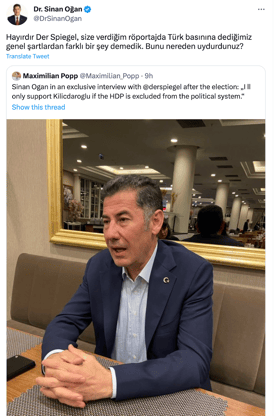
Source: https://twitter.com/DrSinanOgan/status/1657899704556847110
Furthermore, Oğan alleged that foreign voters from Syria and Afghanistan influenced the election results. He stated that they received information about their presence on the voter lists but did not know how they got there or how many there were. According to Oğan, a nationalist politician, they would have received a higher percentage of votes if these foreign voters had not been included. However, there is no proof of such claims. One key policy area for Oğan is the repatriation of the millions of Syrian refugees currently residing in Türkiye.
One claim is that Oğan has already declared his support for Kılıçdaroğlu. In a video after the election, Oğan can be heard saying, “everything will be very nice,” and pledged support for Kılıçdaroğlu. This references Kılıçdaroğlu’s campaign slogan, “everything will be nice.” However, Oğan shared this video before the election, not after. Currently, Oğan has not disclosed who he will endorse in the second round.
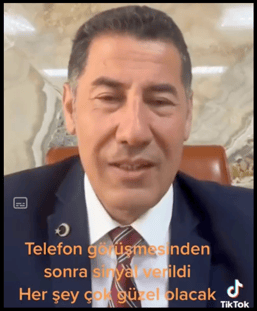
Source: TikTok, https://archive.md/mrt0X
Another claim is that İmamoğlu shows his reaction to the election results through a video, in which he says, “I am sad, very sad, shame on you.” However, this video is from 2019 and has been cropped to give the impression it’s a current reaction.
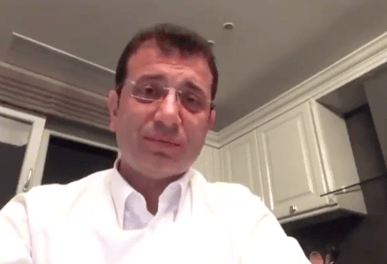
Source: Twitter, https://archive.is/5OKz5
Another video allegedly shows Ankara Mayor, Mansur Yavaş, leaving the Republican People’s Party (CHP) after the election. However, it actually shows events that took place at the Ankara Assembly meeting in May 2022. He is still in post as the Mayor of Ankara and a member of the CHP party.

Source: Twitter, https://archive.ph/48pJz
There were claims that Meral Akşener, the leader of the Good Party, had a personal crisis and physically reacted after the election results, including breaking glass and attacking personnel. However, party officials denied these allegations, releasing a photo with the headline "we are always good." Such claims spread following Akşener's withdrawal from the Table of Six on March 3, 2023, following Kılıçdaroğlu's candidacy announcement. Following her withdrawal, CHP officials persuaded her to swiftly rejoin, and Akşener is still part of the Table of Six.
Social media and disinformation
Ruling candidate Erdoğan’s social media activities, intended to influence the voting process, entered the spotlight over the election weekend. In 2022, Türkiye enacted a “disinformation law.” Under this legislation, spreading false information on social media is considered a crime, and individuals found guilty of disseminating this content can face imprisonment for one to three years. “It criminalizes what the authorities call disinformation without defining what that actually means,” said the journalist Emre Kızılkaya.
This enabled the government to shut down Twitter during the earthquake, a decision heavily criticized by the opposition and social media users alike, who were concerned it would obstruct calls for help and emergency messages from reaching the necessary recipients. The government claimed they had shut down access to stop misinformation from spreading during the aftermath.
While the introduction of the disinformation law was purportedly aimed at curbing false information on social media, Türkiye again restricted access during the recent election. The Erdoğan administration issued orders to Twitter to block the accounts of numerous dissidents over the weekend, and Elon Musk publicly disclosed in a tweet that Twitter complied with this directive. Consequently, freedom of expression and freedom of the press became subjects of renewed debate in Türkiye.
This article has been amended to reflect that the "disinformation law" prison sentence is one - three years, not five as previously reported.


